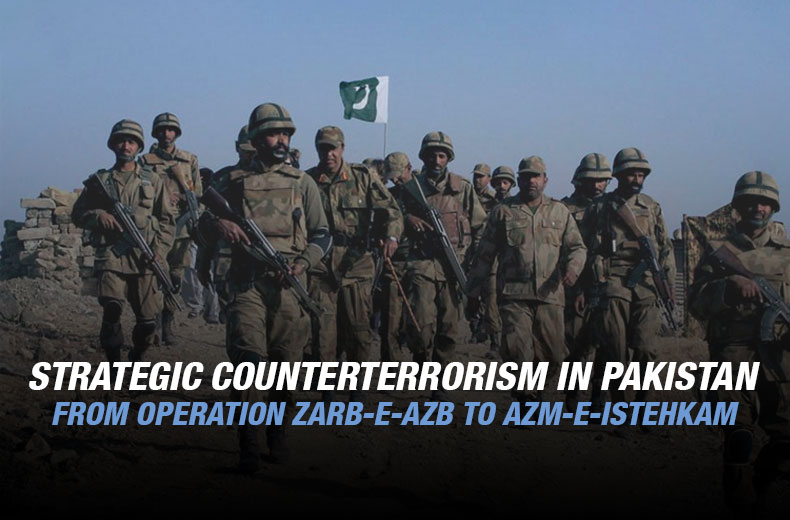Pakistan’s relentless fight against terrorism has seen the launch of several significant military operations aimed at eliminating terrorist networks and restoring peace and stability. Among these operations, Zarb-e-Azb, Radd-ul-Fasaad, and the current Azm-e-Istihkaam have played crucial roles in transforming the nation’s security landscape. This article delves into these operations, their initiators, purposes, necessity, and their impacts, highlighting the pivotal role of the Pakistan Muslim League-Nawaz (PML-N) government in initiating these critical efforts.
Operation Zarb-e-Azb, launched on June 15, 2014, marked a significant turning point in Pakistan’s counterterrorism strategy. Initiated under the leadership of General Raheel Sharif, then Chief of Army Staff (COAS), this operation was a direct response to the escalating terrorist activities, particularly the brazen attack on Jinnah International Airport in Karachi. The PML-N government, under Prime Minister Nawaz Sharif, recognized the urgent need to root out terrorist sanctuaries in North Waziristan, which had become a haven for various terrorist groups, including Tehrik-i-Taliban Pakistan (TTP) and al-Qaeda.
The necessity for Zarb-e-Azb was driven by the rapidly deteriorating security situation in Pakistan, with terrorist attacks becoming more frequent and deadly. The operation aimed to dismantle terrorist infrastructure, eliminate militant hideouts, and re-establish the writ of the state in these troubled regions. By the end of 2016, Zarb-e-Azb had achieved significant success, with the military clearing large areas of North Waziristan, killing over 3,500 militants and capturing many more. The operation also led to the recovery of substantial amounts of arms and explosives, drastically reducing the operational capabilities of terrorist groups and leading to a marked decline in terrorist incidents in Pakistan.
Building on the successes of Zarb-e-Azb, the Pakistan Army launched Operation Radd-ul-Fasaad on February 22, 2017, under the leadership of General Qamar Javed Bajwa, who succeeded General Raheel Sharif as COAS. Unlike Zarb-e-Azb, Radd-ul-Fasaad was a nationwide operation aimed at consolidating the gains of its predecessor and eliminating residual and emerging threats across Pakistan. The PML-N government continued to support these efforts, recognizing the need to address the persistence of terror threats and the evolution of terrorist tactics, including urban terrorism and radicalization.
Radd-ul-Fasaad sought to neutralize all forms of terrorism across Pakistan, dismantle sleeper cells, and prevent the resurgence of terrorist networks. It also focused on de-weaponization and strengthening the capacity of law enforcement agencies. This operation significantly contributed to stabilizing Pakistan’s internal security, leading to numerous intelligence-based operations (IBOs) nationwide and resulting in the arrest and elimination of many terrorists and their facilitators. Enhanced coordination between security and intelligence agencies further strengthened the country’s counterterrorism framework.

Pakistan Prime Minister Shehbaz Sharif chaired a high-powered meeting on June 22 to approve the launch of a new military campaign to curb increasing violence in the country [Handout: Prime Minister’s Office
In 2023, the current Chief of Army Staff, General Asim Munir, launched Azm-e-Istihkaam, meaning “Strengthening Peace,” to sustain the successes achieved through Zarb-e-Azb and Radd-ul-Fasaad while addressing emerging security challenges. This operation aims to ensure the long-term stabilization of areas previously affected by terrorism and militancy. Its objectives include reinforcing the rule of law, promoting socioeconomic development, and countering extremism narratives. The operation also emphasizes enhancing border security, particularly along the Pakistan-Afghanistan frontier, to prevent cross-border infiltration by terrorist elements.
Although Azm-e-Istihkaam is still in its early stages, initial reports indicate a proactive approach in countering residual terrorist threats and fostering community engagement in affected areas. The operation emphasizes rehabilitation and reintegration programs for former militants, aiming to promote peace and development at the grassroots level. In conclusion, operations Zarb-e-Azb, Radd-ul-Fasaad, and Azm-e-Istihkaam represent Pakistan’s comprehensive and strategic efforts to combat terrorism and restore national security. These initiatives, strongly supported and initiated during the tenure of the PML-N government, have not only dismantled significant terrorist networks but also paved the way for long-term peace and stability. The continuous evolution and adaptation of these operations underscore Pakistan’s commitment to eradicating terrorism and fostering a secure and prosperous future for its citizens, with the PML-N playing a crucial role in setting these transformative efforts into motion.

